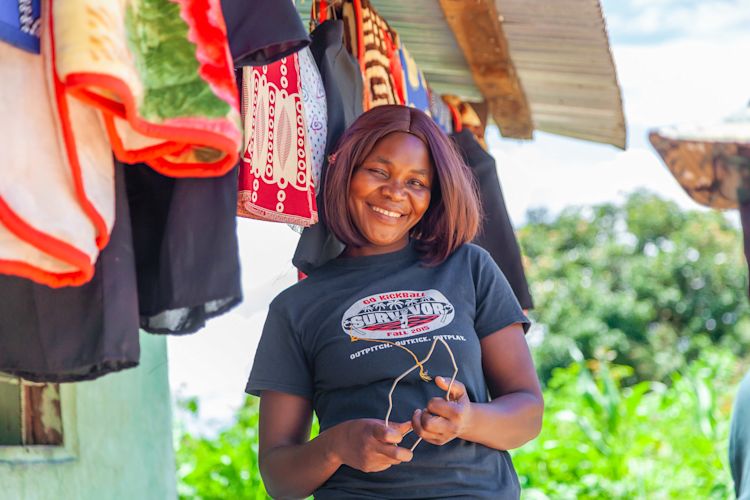
This Financial Inclusion Week, with our partner Jersey Overseas Aid, we’re shining a light on the life-changing work we have been doing to provide people living in Zambia, Rwanda and Sierra Leone with better access to financial services.
Together we launched a joint programme, Branching Out(opens in new window): Financial Inclusion at the Margins in 2017, supporting eight organisations through 19 different grants in Zambia, Rwanda and Sierra Leone towards tackling financial exclusion. Hundreds of savings groups have been created helping more than 124,000 people to gain practical tools so that they can better plan for the future, achieve long term goals and prepare for any unexpected emergencies.
One unexpected emergency that no one saw emerging happened in 2020. The COVID-19 pandemic posed a real danger to those who were already at the margins of society. People like Agness, from the Luapula province of Zambia, who just a few years ago was struggling to make ends meet for her, her husband and three children.
She was selling a small selection of items including salt, soap, and lotion from her home and earning very little profit but since joining the local savings group, set up thanks to the partnership, Agness has learnt about saving, investment and loans.
Just like Agness, nearly two billion other people, have faced barriers which have meant financial services are not accessible. These are:
Living in rural areas
Reduced access to digital technology
Distrust in banks
A lack of financial and digital literacy
With these barriers already existing pre-pandemic, as COVID-19 reached Sub-Saharan Africa in 2020, we commissioned a study(opens in new window) through the Toronto Centre examining crucial lessons learned over the past 12 months from organisations striving to continue to support vulnerable people access financial services throughout the pandemic, to prevent vital progress from being undone.
The findings were largely positive: Countries adapted to a digital approach and navigated the COVID-19 restrictions so they could continue to provide financial services. However, this shift affected the already financially excluded, such as women, youths, SMEs and farmers who still faced barriers, such as lack of trust in this approach and a lack of financial and digital literacy.
A major finding from the study also showed how digitalisation is key for resilience, and the pandemic highlighted that this approach is needed now more than ever. But while digitalisation has been a positive move in many ways, helping to improve financial inclusion rates, there is still work to be done to ensure those most at risk of financial exclusion are not further excluded due to a lack of access to the internet, technology and their understanding of financial and digital literacy.
We knew that the digitisation of financial services was on the horizon, which is why we introduced the Branching Out programme. We didn’t know, however, that the digitalisation of financial services would happen quite so quickly.
Our aim has always been to ensure that those in the most rural communities don’t get left behind when it comes to accessing financial services and, as a result of this report and its findings, we will continue our work to support more people, like Agness, to understand and take control of their personal finances, get back on their feet and plan for their future.
José Morell-Ducós is Portfolio Manager for Financial Inclusion and manages Branching Out: Financial Inclusion at the Margins, a four-year £8 million partnership between Jersey Overseas Aid and Comic Relief. The partnership focuses on financial inclusion as a vehicle for development in Rwanda, Sierra Leone and Zambia.